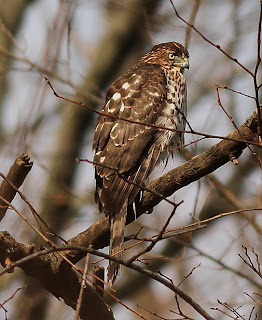Sparrows and raptors are definitely good finds here. I've seen a leucistic Red-tailed Hawk, along with other Red-tailed Hawks, Cooper's Hawks, Turkey Vultures and an occasional Bald Eagle soaring over from the nest at Overpeck County Park. Since I started birding here about a year ago I have seen Swamp, Song, Fox, White-crowned, White-throated and House Sparrows along with Dark-eyed Juncos. Thrushes, warblers, wrens, woodpeckers, other passerines and ducks are also expected on any given birding trip.
Leucistic Red-tailed Hawk in large cottonwood tree (confirmed by Cornell Lab of Ornithology as per the request of the people of the Puffin Center).
Song Sparrow
Downy Woodpecker male
Carolina Wren
Cooper's Hawk juvenile
Downy Woodpecker female
...more juvenile Cooper's Hawk
Hermit Thrush in the trees...
Brown Creeper!
Did you know that thrushes are Neotropical migrant birds? Here is an Audubon video I found pertaining to them and other migrants.
American Robin
The juvenile Cooper's Hawk in flight.
Not the best flight shots as I just pointed my camera straight up into the air and fired away.
Hawk Art?
Winter Wren
A puffball the size of a volleyball...info. about the puffball
Swamp Sparrow
White-throated Sparrow (I did see one juvenile White-crowned Sparrow, however, it was foraging in really dense brush and was impossible to photo)
Phragmites at TCC.
Pictures of the Black Willow trees situated within the park. There are three or four huge ones that are pretty aesthetic to the eyes. The contrast between the blackish trunk the the yellow leaves with a splash of blue in the sky makes them great photo subjects.
Does the picture of this last (first pic above) tree look funny? Well, it should, because the tree got so massive in the lower trunk that it actually sank into the surrounding sediments. If you can imagine about 4-6 more feet of really thick trunk below what you see, then one can imagine how big it looked before it sank.































































No comments:
Post a Comment